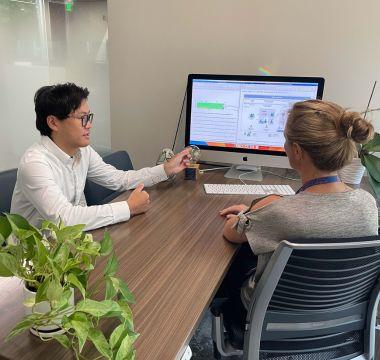My PD Story

Hikaru Kamo, MD, PhD
2025 Melvin Yahr Parkinson’s Disease Clinical Research Award
Improving Deep Brain Stimulation Using Artificial Intelligence
Artificial intelligence (AI) provides exciting new opportunities to improve different facets of society, including analysis of complex medical situations and providing guidance to doctors. Hikaru Kamo, MD, PhD, recipient of the 2025 Melvin Yahr Parkinson’s Disease Clinical Research Award, jointly supported by the Parkinson’s Foundation and the International Association of Parkinsonism and Related Disorders (IAPRD), is investigating if AI can be used to automate and optimize deep brain stimulation (DBS) programming.
While medication is the most common way to help manage Parkinson’s disease (PD) symptoms, when drugs begin to lose their effectiveness, DBS may be an option for some. The treatment involves implanting electrodes into the brain that deliver controlled electrical stimulation that counteracts the disruptive symptoms of the disease.
“As DBS technology advances, its complexity increases,” said Dr. Kamo. “Adjusting the stimulation settings requires specialized expertise, which may not always be available. This creates a gap where patients may not receive optimal care unless they are under the supervision of a specialist.”
During his time as chief medical resident at Juntendo University in Japan, Dr. Kamo treated many people with PD and other movement disorders, gaining firsthand experience with providing DBS treatment. Fascinated by this technology, he then earned his PhD by exploring the science behind DBS and how it can be improved.

In 2024, Dr. Kamo received a travel grant from the Japanese Society of Neurology to join the University of Florida and continue his work. It is there that, thanks to the support of this award, he will study how AI could be used to improve DBS treatments for people with PD.
“Preliminary results suggest that AI-generated settings align with physician-determined settings in about 90% of cases,” says Dr. Kamo. “Currently, physicians adjust DBS settings based on clinical evaluation called monopolar-review, which needs more than 30 minutes of evaluation, but as the technology becomes more complex, AI-assisted programming could simplify the process.”
While the AI programming and coding is complicated, Dr. Kamo’s research study is straightforward. Thirty patients with PD will receive one DBS treatment using settings manually set by a physician, and then another treatment using settings generated by a specialized AI program. This study will be blinded, meaning that both the researchers and participants will not know which treatment is which (physician or AI) until after all data is collected and analyzed.
“If successful, this research could demonstrate that AI-driven DBS programming is as effective, if not more, than traditional methods, offering a more consistent and accessible treatment option for patients,” said Dr. Kamo.
Dr. Kamo’s research has the potential to improve DBS in many ways, specifically, making the treatment more effective and usable for people with PD and doctors.
Meet more Parkinson’s researchers! Explore our My PD Stories featuring PD researchers.
Related Materials
Understanding Deep Brain Stimulation (DBS)
Considering Deep Brain Stimulation
More Stories
from the Parkinson's community


